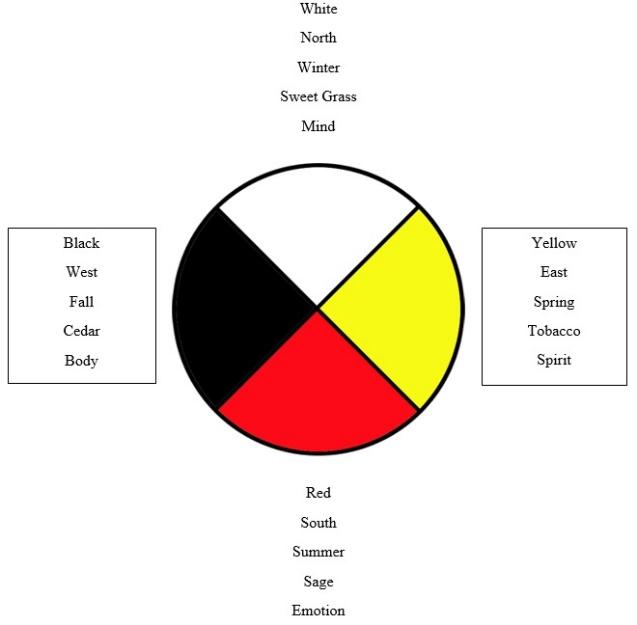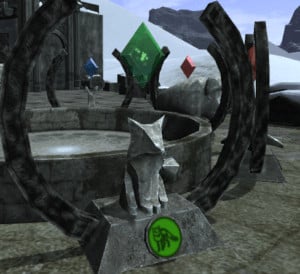Section Navigation
Introduction
This module introduces the concept of self-care as it relates to the Medicine Wheel, and how video games can be used as a positive outlet for well-being. Students will learn what self-care is from a holistic standpoint, and understand the benefits of playing video games. When done in a positive way, video games allow the player to connect with the game and the virtual world, and focus on the objective of the game in a team setting or alone. When this is supported and encouraged by parents, communities, and teachers, it allows students to feel that their interests are important and valid.
Learning Goals
By the end of this module, students will know:
- what self-care is,
- how to practice self-care,
- what a Medicine Wheel is, and
- the benefits of video games.
Vocabulary
- Creation
- land, water, plants, animals, and rocks; essentially everything around us.
- Holistic
- thinking about the “big picture” and how everything is connected and interrelated.
- Medicine Wheel
- an Anishinaabe teaching that encompasses the spiritual, physical, emotional, and mental aspects of a person, as well as their connection to Creation.
- Self-Care
- taking care of your well-being and happiness by engaging in activities that can have long-term positive impacts.
Guiding Questions
- What does the term ‘self-care’ mean to you? Ask this question before providing the definition, to see what self care means to them currently.
- What are the benefits of playing video games? Some possible answers: video games…
- are a creative outlet that teaches problem solving skills,
- provide education about different histories and cultures, and
- connect players from around the world.
Record answers to these questions on a flipchart or paper where all students can see it.
Curriculum Links
This module aligns with Health and Wellness and Heritage and Culture curriculums as it introduces the concept of self-care using the Medicine Wheel, and relates how video games can play a beneficial role for one’s well-being when supported and encouraged by parents, communities, and teachers. Students will think about their current self-care and gaming practices, and how they can modify these to contribute most effectively to their happiness and well-being.
Materials
Medicine Wheel handout – Download Asset Folder (ZIP)
Non-Computer Activity
- Have students sit in a circle.
- Discuss the definition of self-care and ask the guiding questions.
- Provide students with the Medicine Wheel handout.
- Discuss the Medicine Wheel:
- The Medicine Wheel is an Anishinaabe teaching that describes the interconnectedness between the four…
- directions: north, east, south, and west;
- life cycles: infant, youth, adult, and Elder;
- personal aspects: spiritual, emotional, physical and mental.
- These quadrants map out other relationships that are described in sets of four such as colours, seasons, or the sacred medicines (tobacco, sage, sweetgrass, and cedar).
- Other Indigenous communities have different teachings of the Medicine Wheel; one particular teaching does not invalidate another.
- The Medicine Wheel is a very important teaching that has many parts to it, and the information in this module is just a piece of what the teaching encompasses.
- The Medicine Wheel is an Anishinaabe teaching that describes the interconnectedness between the four…
- What positive actions can you take to improve your spiritual, emotional, physical, and emotional well-being? Have students write or draw two or three activities in each section they could do to practice self-care, to satisfy the different aspects of their being.
- Shift the discussion to gaming, and ask the students how playing video games fits into the Medicine Wheel. Are there additional benefits they have thought of that could be plotted onto the Medicine Wheel?
- Playing video games can be beneficial to a person’s well-being when done in a positive way. Look for games that encourage creativity, working in teams, problem solving, learning important points in history, and making friends.
- As with all things in life it’s important to find a balance and have healthy boundaries. It is good to put down the controller or mouse aside sometimes, and engage in other activities.

Computer Activity
Allow students a specific amount of time to play games on the computer. The following are free, Indigenous-designed games:
- Sleep Guardian
- Path Of The Elders (requires an account)
Resources
Online Articles
- Indigenous video games to watch out for
- Indigenous video game designer takes stand against Custer’s Revenge
- New ways to portray Indigenous people in video games




